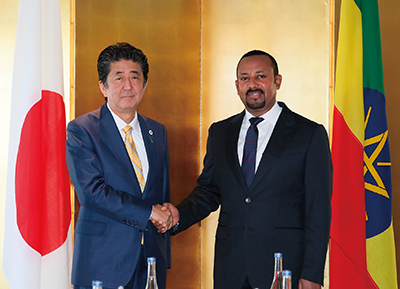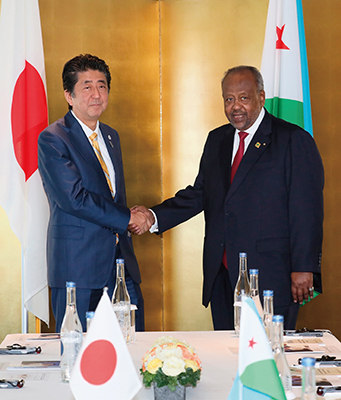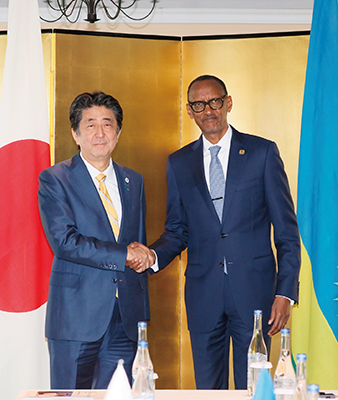Diplomatic Bluebook 2020
Chapter 2
Japan's Foreign Policy that Takes a Panoramic Perspective of the World Map
2 East Africa
(1) Ethiopia
With the population of more than 100 million and home to the headquarters of the AU and the United Nations Economic Commission for Africa (UNECA), Ethiopia is the most populous country in the East Africa region and plays an important political role in the African continent. On the economic front, Ethiopia's economy continues to grow steadily, and aims to become a middle-income country by 2025. In October, it was announced that Prime Minister Abiy would be awarded the Nobel Peace Prize for his contribution to peace in the region, including the resumption of diplomatic relations between Ethiopia and its neighboring Eritrea, after 20 years of conflict.
Foreign Minister Kono visited Ethiopia in May and met with Prime Minister Abiy and State Minister of Foreign Affairs Markos. In addition, Prime Minister Abiy visited Japan in August with Minister of Foreign Affairs Gedu to participate in TICAD7, and in October, Former President Mulatu visited Japan for the Ceremony of the Enthronement of His Majesty the Emperor. Prime Minister Abe held a meeting with both of them respectively. Furthermore, in November, the Exchange of Notes was signed concerning an ODA yen loan (approximately 9.7 billion yen) for a project to upgrade the road between Jimma and Chida.
 Japan-Ethiopia Summit Meeting
Japan-Ethiopia Summit Meeting (August 29, Yokohama; Photo: Cabinet Public Relations Office)
(2) Eritrea
After Eritrea gained its independence from Ethiopia in 1993, a border dispute that broke out from 1998 to 2000 left the two countries in a state of conflict, but in July 2018, the diplomatic relations were resumed for the first time in 20 years. In addition, in November 2018, a resolution to lift sanctions imposed by the UN Security Council since 2009 was unanimously adopted.
Minister of Foreign Affairs Osman visited Japan in March 2019 upon invitation by the Ministry of Foreign Affairs of Japan and had a foreign ministers' meeting with Foreign Minister Kono. Minister of Foreign Affairs Osman visited Japan again in August to participate in TICAD7 and had a meeting with Foreign Minister Kono.
(3) Kenya
Kenya plays a central role in the regional economy with its port of Mombasa, the largest in East Africa, serving as a gateway to East and Central Africa. Kenya also contributes to the peace and stability of the region as a stabilizing force in East Africa by engaging in efforts to build peace in Somalia, South Sudan, and elsewhere. In domestic affairs, President Kenyatta launched in 2017 the BIG4 five-year economic development plan consisting of four pillars in the fields of (1) manufacturing, (2) food security, (3) universal health coverage, and (4) affordable housing, and is engaged in a new nation building effort.
A number of important ministers, including Cabinet Secretary for Foreign Affairs Juma, visited Japan in August with President Kenyatta to attend TICAD7 and had meetings with Prime Minister Abe and Foreign Minister Kono.
(4) Djibouti
Djibouti, situated at one of the great trade arteries that passes through the Indian Ocean and connects Europe and Asia, is aiming to be a distribution hub of East Africa. It is a base for international security and is also a key country in achieving a “Free and Open Indo-Pacific (FOIP).”
Since 2011, Djibouti has been hosting the facility of Japan Self-Defense Forces to carry out Japan's counter-piracy operations, and the two countries have been developing an excellent relationship. President Guelleh and Minister for Foreign Affairs and International Cooperation Youssouf visited Japan in August 2019 to attend TICAD7 and President Guelleh had a meeting with Prime Minister Abe. In addition, Prime Minister Abdoulkader visited Japan in October for the Ceremony of the Enthronement of His Majesty the Emperor and had a meeting with Special Advisor to the Prime Minister Kihara Minoru and Minister of Defense Kono. In December, Special Advisor to the Prime Minister Kihara and Minister of Defense Kono each visited Djibouti, making 2019 a year for active exchange of high-ranking officials.
 Japan-Djibouti Summit Meeting
Japan-Djibouti Summit Meeting (August 29, Yokohama; Photo: Cabinet Public Relations Office)
In September, the Exchange of Notes was signed for ODA grant aid (grant limit of approximately 4.1 billion yen) for “The Project for the Reinforcement of Maritime Transport Capacity at the Gulf of Tadjourah,” and, additionally, in case of heavy rain and flood disaster in November, a part of the Self-Defense Forces unit originally deployed for anti-piracy operations conducted International Disaster Relief Operations such as drainage and cleaning work at an elementary school and transferring emergency relief goods provided by Japan.
(5) Sudan
Sudan is the second largest country by area in Sub-Saharan Africa, and is blessed with crude oil, minerals, as well as water resources and fertile arable land from the Nile River. In April, the Bashir administration, which had been in power for 30 years, collapsed, and the domestic security situation temporarily deteriorated. However, in August, a new provisional government based on power sharing between the armed forces and the people was established, with an agreement to form a new government by holding democratic elections after an interim three-year period. The new provisional government has put priorities on the end of the civil war and economic revitalization and aims to realize nation building in coordination and cooperation with the international community.
Undersecretary of the Ministry of Foreign Affairs and International Cooperation Ilham attended the Special Conference on Peace and Stability in the Horn of Africa and the Neighboring Region held at TICAD7.4
- 4 Following the decision of the AU to suspend Sudan's AU membership (June to September 5, 2019), Sudan did not participate in the TICAD7 plenary session but did participate in the Special Conference on Peace and Stability in the Horn of Africa and the Neighboring Region.
(6) Seychelles
Although Seychelles has the highest gross national income per capita (GNI) of 15,600 US dollars (2018) in Sub-Saharan Africa, it is a small island country with vulnerabilities in fields such as climate change and disaster prevention.
In January, the Embassy of Japan in Seychelles was newly established. In August, President Danny Faure and Secretary of State Ambassador Barry Faure visited Japan to attend TICAD7. They met with Prime Minister Abe and State Minister for Foreign Affairs Sato Masahisa, and confirmed the strong bilateral relationship between Japan and Seychelles. In addition, in October, the Exchange of Notes was signed regarding ODA grant aid for the Project for the Capacity Improvement of Maritime Safety (800 million yen).
(7) Somalia
In Somalia, a unified government was established in 2012 for the first time in 21 years, but Somalia is still in the process of building a country due to the humanitarian crises, such as droughts and continuing activities by the terrorist organization Al-Shabaab.
In August, President Mohamed visited Japan to participate in TICAD7 and met with Prime Minister Abe. In October, State Minister for Foreign Affairs and International Cooperation Abdulkadir visited Japan for the Ceremony of the Enthronement of His Majesty the Emperor and met with State Minister for Foreign Affairs Suzuki Keisuke. In November, the signing and exchange of notes regarding ODA grant aid (approximately 500 million yen) took place to provide Somalia with the equipment and data for creating topographic maps and to support improvements in map-making capacity.
(8) Madagascar
The presidential election in Madagascar was peacefully held in 2018, following the presidential election in 2013, and President Rajoelina was elected. Based on the democratic outcomes of the last five years, Madagascar's economic growth is expected to accelerate.
2019 was a year for active exchange of high-ranking officials. In January, Special Envoy of the Prime Minister, Mr. Akiba Kenya (member of the House of Representatives), attended President Rajoelina's inauguration ceremony, and afterwards Parliamentary Vice-Minister for Foreign Affairs Yamada Kenji also visited Madagascar. In addition, President Rajoelina visited Japan in August to participate in TICAD7.
On the economic front, the integrated production of nickel and cobalt ores, which is the largest mining investment in Africa by a Japanese company, is contributing to Madagascar's economy. In addition, Japan is supporting the expansion of Toamasina Port, Madagascar's largest port, with yen loans.
(9) South Sudan
Turmoil has continued in South Sudan since the clashes in the capital, Juba, in December 2013. Mediation efforts by the Intergovernmental Authority on Development (IGAD)5 are ongoing. The Khartoum Declaration relating to a permanent ceasefire was issued in June after the second conflict in July 2016, and President Kiir, former first Vice President Machar, and others signed a reinvigorated conflict resolution agreement in September. However, the establishment of the new transitional government was realized only in February 2020 after two postponements, in May and November 2019, due to provisional security measures and problems with borders and the number of states.
Foreign Minister Kono visited South Sudan in May, and Vice President Igga visited Japan in August to participate in TICAD7.
(10) Rwanda
In 2019, 25 years after the Rwandan genocide, under the leadership of President Kagame, the country continues working toward economic growth and national reconciliation. In recent years, Rwanda has garnered interest from Japanese companies mainly in the field of information and communication technology (ICT), and, against this backdrop, 2019 was a year which saw a heightened momentum for further promotion of Japan-Rwanda relations.
In January, President Kagame visited Japan and held a summit meeting with Prime Minister Abe and a business forum. In March, Parliamentary Vice-Minister for Foreign Affairs Yamada visited Rwanda and attended the Africa CEO Forum,6 where he discussed the upcoming TICAD, and held talks with Minister of Foreign Affairs and International Cooperation Sezibera and Minister of ICT and Innovation Ingabire. In August, President Kagame visited Japan for the sixth time to participate in TICAD7, and held the second Japan-Rwanda Summit Meeting for 2019.
 Japan-Rwanda Summit Meeting
Japan-Rwanda Summit Meeting (August 29, Yokohama; Photo: Cabinet Public Relations Office)
The fields of cooperation between Japan and Rwanda are expanding, and, in September, Rwanda's RWASAT-1, jointly assembled by Rwandan engineers and the University of Tokyo, was launched into orbit.
- 5 IGAD: a regional economic community in eastern Africa.
- 6 An international conference started in 2012, bringing together in one place business owners, investors, and government officials from inside and outside Africa for the purpose of conducting discussions focused on private investment in Africa.
